Racism | Justice | Human Rights | World Peace | Equality | Prosperity of Humankind | Sustainable Development | Values | Nature
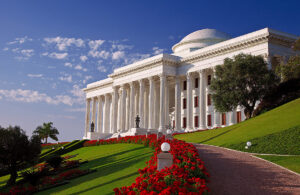
The Universal House of Justice
To the Baha’is of the United States – July 2020
Racism is a profound deviation from the standard of true morality. It deprives a portion of humanity of the opportunity to cultivate and express the full range of their capability and to live a meaningful and flourishing life, while blighting the progress of the rest of humankind. It cannot be rooted out by contest and conflict. It must be supplanted by the establishment of just relationships among individuals, communities, and institutions of society that will uplift all and will not designate anyone as “other”. The change required is not merely social and economic, but above all moral and spiritual. (audio)
To participants of the 2019 Bicentennial of the Birth of the Báb
If the teachings brought by Bahá’u’lláh are what will enable humanity to advance to the highest levels of unity, then one must search the soul for the right response. The multitudes who recognized the Báb were summoned to heroism, and their magnificent response is recorded by history. Let every one who is awake to the condition of the world, and to the persistent evils that warp the lives of its inhabitants, heed Bahá’u’lláh’s call to selfless and steadfast service—heroism for the present age. What else will rescue the world but the efforts of countless souls who each make the welfare of humanity their principal, their dominating concern?
A Letter addressing World Peace – January 2019
We find it propitious, at this moment, to reflect on the progress made on that journey, the contemporary challenges to peace, and the contribution to its attainment that Bahá’ís are called to make… It is through love for all people, and by subordinating lesser loyalties to the best interests of humankind, that the unity of the world can be realized and the infinite expressions of human diversity find their highest fulfilment. (audio)
To the Baha’i World about Social and Economic Development – November 2018
Announcing the establishment of new institution at the World Centre – the Bahá’í International Development Organization to promote and coordinate the efforts of the worldwide Baha’i community in social and economic development. For encouragement and insight it directs the friends to look to the words of ‘Abdu’l-Baha: “We should continually be establishing new bases for human happiness and creating and promoting new instrumentalities toward this end. How excellent, how honorable is man if he arises to fulfill his responsibilities; how wretched and contemptible, if he shuts his eyes to the welfare of society and wastes his precious life in pursuing his own selfish interests and personal advantages. Supreme happiness is man’s, and he beholds the signs of God in the world and in the human soul, if he urges on the steed of high endeavor in the arena of civilization and justice.”

A Letter for the Bicentenary of the Birth of Baha’u’llah – October 2017
To all who celebrate the Glory of God – This salutary truth we maintain: that the peoples of the earth have always been remembered by their God. In every era of history, that unknowable Reality has opened the gates of grace to the world by sending an Emissary charged with providing the moral and spiritual stimulus that human beings need to cooperate and advance… As the world now faces its most pressing challenges yet, we acclaim Baha’u’llah, born two hundred years ago, as such a Figure–indeed, as the One Whose teachings will usher in that long-promised time when all humanity will live side by side in peace and unity… “It is the duty of every seeker to bestir himself and strive to attain the shores of this ocean.” Baha’u’llah
A Letter addressing the Economy – March 2017
…we hope that the comments below will stimulate thoughtful, ongoing reflection by the friends. The aim is to learn about how to participate in the material affairs of society in a way that is consistent with the divine precepts and how, in practical terms, collective prosperity can be advanced through justice and generosity, collaboration and mutual assistance… Wealth must serve humanity. Its use must accord with spiritual principles; systems must be created in their light. And, in Bahá’u’lláh’s memorable words, “No light can compare with the light of justice. The establishment of order in the world and the tranquillity of the nations depend upon it.” Economics: a study of this letter presented by Wendi Momen for the Wilmette Institute course “The Baha’i Faith and Social Change”. (audio)
One Common Faith – 2005
In April 2002 (seven months after 9/11) the Universal House of Justice sent a letter “To the World’s Religious Leaders” where it asked that world religious leaders consider what their role is in bringing unity to the human race. It asked for a dialogue among their adherents on the topic and it ended the letter with a clear instruction and warning from Baha’u’llah; “The well-being of mankind, its peace and security, are unattainable unless and until its unity is firmly established.” In 2005, the Universal House of Justice acted on its own request in the letter “To the World’s Religious Leaders”, namely, they published One Common Faith to the Baha’is of the world to start this dialogue. Study Companion
To The World’s Religious Leaders – 2002
The disease of sectarian hatreds, if not decisively checked, threatens harrowing consequences that will leave few areas of the world unaffected… The time has come when religious leadership must face honestly and without further evasion the implications of the truth that God is one and that, beyond all diversity of cultural expression and human interpretation, religion is likewise one…Far from challenging the validity of any of the great revealed faiths, the principle has the capacity to ensure their continuing relevance. In order to exert its influence, however, recognition of this reality must operate at the heart of religious discourse…
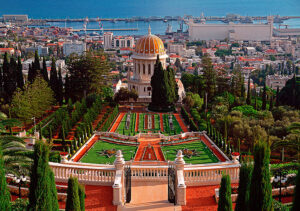
The Opening of the 19 Terraces of the Shrine of the Bab on Mount Carmel – 22 May 2001
A Statement of the Universal House of Justice delivered by Dr. Albert Lincoln, Secretary General of the Baha’i International Community
The sufferings sustained by the Bab so as to arouse humanity to the responsibilities of its coming age of maturity were themselves indications of the intensity of the struggle necessary for the world’s people to pass through the age of humanity’s collective adolescence. Paradoxical as it may seem, this is a source of hope. The turmoil and crises of our time underlie a momentous transition in human affairs. Simultaneous processes of disintegration and integration have clearly been accelerating throughout the planet since the Bab appeared in Persia. That our Earth has contracted into a neighbourhood, no one can seriously deny. The world is being made new. Death pangs are yielding to birth pangs. The pain shall pass when members of the human race act upon the common recognition of their essential oneness. There is a light at the end of this tunnel of change beckoning humanity to the goal destined for it according to the testimonies recorded in all the Holy Books. (News Story of this historic event)
Century of Light – March 2001
Foreword: The conclusion of the twentieth century provides Bahá’ís with a unique vantage point. During the past hundred years our world underwent changes far more profound than any in its preceding history, changes that are, for the most part, little understood by the present generation. These same hundred years saw the Bahá’í Cause emerge from obscurity, demonstrating on a global scale the unifying power with which its Divine origin has endowed it. As the century drew to its close, the convergence of these two historical developments became increasingly apparent. Century of Light, prepared under our supervision, reviews these two processes and the relationship between them, in the context of the Bahá’í Teachings. We commend it to the thoughtful study of the friends, in the confidence that the perspectives it opens up will prove both spiritually enriching and of practical help in sharing with others the challenging implications of the Revelation brought by Bahá’u’lláh. The Universal House of Justice
The Promise of World Peace – 1985
To the Peoples of the World – A statement of The Universal House of Justice
For the first time in history it is possible for everyone to view the entire planet, with all its myriad diversified peoples, in one perspective. World peace is not only possible but inevitable. It is the next stage in the evolution of this planet—in the words of one great thinker, “the planetization of mankind”.
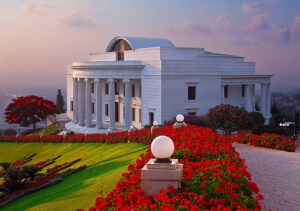
Bahá’í International Community Office of Public Information, Haifa
The Millennium World Peace Summit: A Baha’i Perspective – August 2000
Presented by Dr. Albert Lincoln, Secretary-General of the Baha’i International Community.
Our Children Are Our Future: Each child is potentially the light of the world, and its darkness. Lighting the lamps of these souls is a responsibility we must collectively assume if civilization is to thrive. Children must not be deprived of the light of moral education, especially the girl-child, who is the transmitter of values to future generations. Indeed, educated women are one of the most important keys to world peace.
The Prosperity of Humankind – 1995
First distributed at the United Nations World Summit on Social Development, Copenhagen, Denmark
Examines prevailing attitudes and practices in social and economic development. It redefines the roles of all those involved and questions underlying assumptions about the nature of true global prosperity. Addresses Justice, Human Rights, and the need for Consultation at all levels of society. “No man can attain his true station”, is Bahá’u’lláh’s counsel, “except through his justice. No power can exist except through unity. No welfare and no well-being can be attained except through consultation.”
Baha’i International Community – New York / Geneva / BIC
One Planet, One Habitation: A Baháʼí Perspective on Recasting Humanity’s Relationship With the Natural World – June 2022
“Will humanity act on the truth that its own destiny and that of the planet are irrevocably intertwined? Or will still greater calamities be required to move it to action?” asks the Bahá’í International Community (BIC) in a statement it released on the occasion of Stockholm+50. Climate change and other major crises in the world are compelling humanity to recognize its singular existence as a species, and therefore, its need for new patterns of organization that are commensurate with today’s needs. “This span of earth is but one homeland and one habitation. It behooveth you to abandon vainglory which causeth alienation and to set your hearts on whatever will ensure harmony.” Baha’u’llah
A Governance Befitting Humanity and the Path Towards a Just Global Order – 2020
A Statement of the Baha’i International Community on the Occasion of the 75th Anniversary of the United Nations
THE 75TH ANNIVERSARY of the United Nations arrives as rapidly shifting global realities prompt a deeper appreciation of humanity’s interconnection and interdependence. Amidst the disruption created and accelerated by a world-engulfing pandemic, numerous possibilities are opening for marked social change that can bring stability to the world and enrich the lives of its inhabitants… The human family is one. This is a truth that has been embraced by multitudes around the world. Its profound implications for our collective behavior must now give rise to a coordinated movement toward higher levels of social and political unity. As Bahá’u’lláh declared over a century ago, “True peace and tranquility will only be realized when every soul will have become the well-wisher of all mankind.” The perils of a global community divided against itself are too great to countenance.
Rethinking Prosperity: Forging Alternatives to a Culture of Consumerism – 2010
a number of underlying conceptions will need to be examined and, in many cases, revised in order to advance the goals therein. These include conceptions of human nature; of development (and the nature of progress and prosperity); of the nature and causes of recent economic crises; of processes of technological development; and of the means and ends of educational processes.
Baha’i Statement Against Racism – April 2009
Submitted by the Baha’i International Community – Geneva, to the Durban Review Conference Against Racism, Racial Discrimination, Xenophobia and Related Intolerance
Remedies to racial prejudice, xenophobia and intolerance must accordingly address, first and foremost, the mental illusions that for thousands of years have generated false concepts of superiority and inferiority among human beings…The reality is that there is only one human race…Recognition of this truth is the antidote to racism, xenophobia and related intolerance…The principle of human oneness strikes a chord in the deepest reaches of the spirit….Perceiving humanity’s collective oneness comes after a historic process in which individuals gathered into ever greater units. From clans to tribes, to city-states and nations…the next step for humanity is to create a diverse and yet unified global civilization – where all people, populations and cultures are component parts of a single organism: humanity itself.
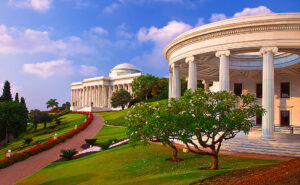
60th Anniversary of the Universal Declaration on Human Rights – June 2008
Today, with renewed urgency and vigor, Bahá’ís strive to bring into being the global community envisioned in the Universal Declaration of Human Rights. The worldwide Bahá’í community pledges to continue and expand its efforts, and to join with others to eliminate all forms of prejudice, to reduce the extremes of wealth and poverty, to achieve full equality of men and women, to promote sustainable development and to foster understanding among the world’s religions. In this way, we strive to uphold the Bahá’í teaching, which states that “It is not his to boast who loveth his country, but it is his who loveth the world.” That which uplifts the most vulnerable amongst us, uplifts us all.
The Search for Values in an Age of Transition: – includes Study Guide – 2005
Why, given the dramatic increase of mechanisms and fora for cooperation is the world so deeply divided against itself? Why the universal affliction, which assails relations between those of different cultures, creeds, religions, political affiliations, economic status and gender? To answer theses questions, we must examine dispassionately the legal standards, political and economic theories, values and religious formulae, which have ceased to promote the welfare of humankind… Our inherited notions of religion as an irrelevant and obstructionist voice in the international public sphere offer no help in resolving the complex problems before the leaders of the world’s nations. In fact, the appropriate role of religion in the public sphere is one of the most pressing issues of our time.
Who is Writing the Future?: Reflections on the Twentieth Century – February 1999
Published to mark the end of the 20th century, this statement reflects upon human progress thus far, in the context of an ever-advancing civilization. What we are witnessing, it says, is the beginning of the history of humankind, the history of a human race conscious of its own oneness. Humanity, the arrowhead of the evolution of consciousness, passes through stages analogous to the periods of infancy, childhood, and adolescence in the lives of its individual members. The journey has brought us to the threshold of our long-awaited coming of age as a unified human race. The wars, exploitation, and prejudice that have marked immature stages in the process should not be a cause of despair but a stimulus to assuming the responsibilities of collective maturity.
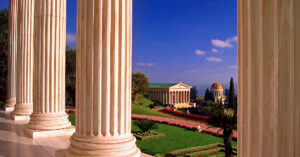
Turning Point for All Nations – 1995
A Statement of the Bahá’í International Community on the Occasion of the 50th Anniversary of the United Nations. The section titled: A Strengthened World Court– Addresses Justice – Justice is a thread that must be woven into the consideration of every interaction, whether in the family, the neighborhood, or at the global level Also addresses: Releasing the Power of the Individual, Economic Development, Protecting Fundamental Human Rights, Advancing the Status of Women and Moral Development.
World Citizenship: A Global Ethic for Sustainable Development – 1993
The challenge of sustainable development is to inspire in people the willingness to think and act differently – the desire to become responsible citizens of an interdependent world…This sense of responsibility flows naturally from the recognition of the oneness of humanity and is best sustained by a unifying vision of a peaceful, prosperous world society. Without such a global ethic and a world-embracing vision, people will be unable to become active, constructive participants in the world-wide process of sustainable development.
Statement on Bahá’u’lláh: A brief introduction to Bahá’u’lláh’s life and work – 1992 – marks the centenary of the passing of Bahá’u’lláh
For, without a common conviction about the course and direction of human history, it is inconceivable that foundations can be laid for a global society to which the mass of humankind can commit themselves. Such a vision unfolds in the writings of Bahá’u’lláh, the nineteenth-century prophetic figure whose growing influence is the most remarkable development of contemporary religious history.
The Baha’i Statement on Nature – 1987 | The Assisi Declarations – 1986
In September of 1986 the World Wide Fund for Nature (WWF) launched their Network on Conservation and Religion, bringing religious leaders representing Buddhists, Christians, Hindus, Jews and Muslims together with environmental leaders in Assisi, Italy. Each of the five religions represented there issued a declaration on nature. As of October 1987, the Bahá’ís became the sixth major religion to join this new alliance, and put forward this statement in support of the Network’s objectives.
,Bahá’u’lláh, Prophet-Founder of the Bahá’í Faith, outlines the essential relationship between man and the environment: that the grandeur and diversity of the natural world are purposeful reflections of the majesty and bounty of God. For Bahá’ís, there follows an implicit understanding that nature is to be respected and protected, as a divine trust for which we are answerable.
(Additional Statements of the BIC)

The National Spiritual Assembly of the Bahá’ís of the United States
A Common Endeavor: Building America’s Future – Full broadcast May 1, 2025 – This special event explored the profound challenges and opportunities facing America, featuring inspiring messages and moving videos on themes such as:
- The oneness of humanity and the urgent need to eliminate racism
- America’s unique spiritual destiny and role in achieving global peace
- Empowerment of youth as leaders and agents of societal transformation
- Viewing religion as a source of unity and harmony
- Building inclusive communities
The Nine Year Plan and the Destiny of America – September 30, 2024 – (video) A letter from the National Spiritual Assembly on the Nine Year Plan and the Destiny of America. This message reflects on the current state of our nation, reminds us of the numerous references in the Bahá’í Writings to the unique role that America is destined to play in the birth of the New World Order and the indispensable contribution of the Bahá’í community towards its achievement, and points the way forward through pursuit of the aims of the Nine Year Plan.
The National Assembly’s letter is accessible through the links here, in English, Persian, Spanish, and Swahili. (Study Guide)
Forging A Path To Racial Justice – June 2020
To create a just society begins with recognition of the fundamental truth that humanity is one. But it is not enough simply to believe this in our hearts. It creates the moral imperative to act, and to view all aspects of our personal, social, and institutional lives through the lens of justice. It implies a reordering of our society more profound than anything we have yet achieved. And it requires the participation of Americans of every race and background, for it is only through such inclusive participation that new moral and social directions can emerge.
A Call for Transformation at this Pivotal Time in America – February 2017
The tensions, divisions, and injustices that currently beset America are symptoms of a longstanding illness. The nation is afflicted with a deep spiritual disorder, manifest in rampant materialism, widespread moral decay, and a deeply ingrained racial prejudice. As a result, millions of our fellow Americans, subject to systemic injustices in many facets of life, are prevented from making their full contributions to society and of partaking fully in its benefits. No one is immune to this disorder―we are all members of this society and to some degree suffer the effects of its maladies. That we live in a critical time can be seen in the way essential questions of identity, social vision, and global relations are being raised to a degree not seen in decades. Increasing numbers of our fellow-citizens are actively in search of solutions both moral and practical to answer them…The resolution to these challenges lies in recognizing and embracing the truth at the heart of Bahá’u’lláh’s Revelation―the incontrovertible truth that humanity is one. Ignorance of this truth―which embodies the very spirit of the Age―is itself a form of oppression, for without it, it is impossible to build a truly just and peaceful world.
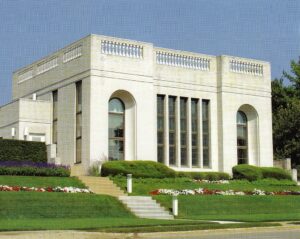
Two Wings of a Bird: The Equality of Women and Men – 1997
Over a century ago, for the first time in religious history, Bahá’u’lláh, the Founder of the Bahá’í Faith, in announcing God’s purpose for the age, proclaimed the principle of the equality of women and men, saying: “Women and men have been and will always be equal in the sight of God.”
Unity and Consultation: Foundations of Sustainable Development – 1994
The path toward sustainable development can only be built upon the deep comprehension of humanity’s spiritual reality – a reality that lies at the very essence of human beings. It is our spiritual nature that is the source of human qualities that engender unity and harmony, that lead to insight and understanding, and that make possible collaborative undertakings. Such qualities – compassion, forbearance, trustworthiness, courage, humility, cooperation, and willingness to sacrifice for the common good – form the invisible yet essential foundations of human society…To ensure that these collaborative undertakings are successful, however, new modalities of decision-making will be needed…. Even the most mature democratic systems suffer from political paralysis, with competing parties or groups claiming that they can solve the difficult problems of the day better than their opponents. Clearly, cooperative and fully inclusive approaches to decision-making must become an integral feature of the sustainable development process.
The Vision of Race Unity: America’s Most Challenging Issue – 1991
Some themes within this document: 1. Racism in America is a betrayal of itself – affront to human dignity. 2. Oneness of Humanity abundantly confirmed by science. 3. Education on the Oneness of Humanity shortest route out of prejudice. 4. America’s standing in the international community, peace and prosperity depend on the resolution of this issue. 5. America’s example would have profound influence on the world society and assist in establishing world peace.
United Nations
Universal Declaration of Human Rights – December 1948
Bahá’í International Community on the 60th Anniversary of the Universal Declaration on Human Rights – February 2008
At the outset of this anniversary year, we wish to affirm the unparalleled and enduring significance of the Universal Declaration of Human Rights. The adoption of this Declaration on December 10th, 1948 marked one of the first collective expressions of an international community. With no dissenting votes, the fifty-six member states of the United Nations, from all regions, affirmed the inherent dignity of the human being, the rule of law over the rule of force, and placed the well-being of the individual at the center of international law. The moral terrain of international relations was redrawn. To date, this historic document has inspired over sixty international treaties and conventions, which have acquired increasing authority through incorporation into national legal systems. (full text)
Earth Charter International
Earth Charter – The official launch was on 29 June 2000 in a ceremony at The Peace Palace in The Hague, Netherlands.
The Earth Charter is an ethical foundation for actions to build build a more just, sustainable, and peaceful global society in the 21st century. It articulates a mindset of global interdependence and shared responsibility. It offers a vision of hope and a call to action.
Preamble We stand at a critical moment in Earth’s history, a time when humanity must choose its future. As the world becomes increasingly interdependent and fragile, the future at once holds great peril and great promise. To move forward we must recognize that in the midst of a magnificent diversity of cultures and life forms we are one human family and one Earth community with a common destiny. We must join together to bring forth a sustainable global society founded on respect for nature, universal human rights, economic justice, and a culture of peace. Towards this end, it is imperative that we, the peoples of Earth, declare our responsibility to one another, to the greater community of life, and to future generations.
Statement, Offering Suggestions for the Proposed Earth Charter by the Baha’i International Community – April 1991
The following statement, offering suggestions for the proposed “Earth Charter,” was originally presented by the Bahá’í International Community to the Preparatory Committee of the United Nations Conference on Environment and Development (UNCED) and reprinted for distribution at UNCED. As currently proposed by the UNCED Secretariat, such a Charter would be one of six major themes to be addressed by world leaders gathered at UNCED in Brazil in June 1992.